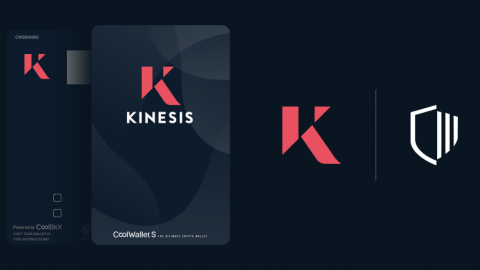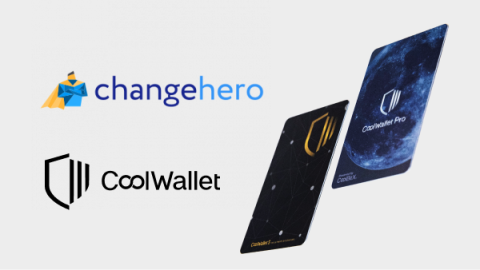Table of Contents
- Introduction
- DeFi Volume Explodes After SEC Charges
- Understanding The Regulatory Crackdown
- Howey Test and crypto securities
- The Case for Self-Custody
- Self-custody stress free with CoolWallet
- How to Transfer Your Funds and Self-Custody with CoolWallet
- The Future of Crypto: Embracing Uncertainty with Confidence
Introduction
In a double blow for the crypto industry, the US Securities and Exchange Commission (SEC) has filed a lawsuit against the world’s biggest crypto exchange Binance and its founder, Changpeng “CZ” Zhao, and has taken action against Coinbase, signaling a major shift in cryptocurrency regulation in the US. It’s not unexpected, and can partly be attributed to the fallout from the FTX collapse that saw retail investors lose billions of dollars and SEC enforcements jump by 200%.
Under its chairman Gary Gensler, the SEC has adopted a clear hostile stance towards the industry, calling it a scam and opting for enforcement-based regulation instead of providing clear guidelines for compliance. Gensler considers most cryptocurrencies to be securities and wants them regulated accordingly. It’s a remarkable U-turn by him within only a few years when he was still an MIT professor and actually approached CZ in 2019 to be an advisor to Binance.
This regulatory crackdown, combined with the recent collapse of major banks serving the crypto industry, suggests a deliberate strategy to cut off US exchanges from banking services and erode investor confidence through litigation. Despite Coinbase’s best efforts to comply in the last 12 months, the SEC has been unresponsive in their feedback.
In its case against Coinbase, the SEC has also declared 10 new cryptocurrencies such as Solana and Cardano as securities, causing their values to plummet. At present 67 cryptos are viewed as securities by the SEC, which accounts for about 10% of crypto’s $1 trillion total market cap.
While conditions are tough, it’s not all bad.
Both Binance and Coinbase are prepared for a lengthy legal battle, which if successful could set important precedents and bring regulatory clarity to the US. At the very least it’s stirring a strong debate in the US between politicians, the public and financial leaders on the future of crypto in the US and the role the country wants to play as global leader.
The upcoming US presidential election in 2024 also offers hope for the industry, as there are already a number of crypto-friendly candidates taking up its cause such as Robert F. Kennedy Jr and Tulsi Gabbard. US elections are won with very slight margins, and with 1 in 5 Americans owning crypto, it may become a massive factor next year. Most likely Gensler will finish up at the SEC by 2025 or sooner either way.
Alternative jurisdictions with clear regulations such as Hong Kong, UAE, and the UK and EU are also emerging, offering options for US companies seeking more favorable environments.
The SEC actions are also uniting the crypto sector, which can be quite divisive and tribal at times.
CoolWallet stands in solidarity with Binance and Coinbase, and we wish them the best in their upcoming battles which will impact the entire industry. As a dedicated non-custodial wallet solution that launched back in 2014, we believe that self-custody in cold storage remains the safest way to protect your digital assets portfolio, and the latest developments reinforce this belief yet again.
DeFi Volume Explodes After SEC Charges
In the 2 days after the legal shock, DeFi volume exploded by nearly 450% as US customers moved nearly $2 billion off Binance and Coinbase, with $800 million finding its way to DEXs.
CoinGecko reported that the total daily trading volume on Uniswap (Ethereum and Arbitrum) and PancakeSwap (BSC), which make up over half of DEX trading volume, jumped by $792 million between June 5 and 7.
Last year’s wave of custodian bankruptcies proved that self-custody of crypto assets is non-negotiable if you want to preserve your wealth. In 2023, the SEC’s charges against Binance and Coinbase, the two exchanges probably doing more to comply with regulations than any of their peers, and who last month together accounted for over 60% of all CEX trading volume, again emphasize a simple but inconvenient truth for the retail investor: It doesn’t matter how good your centralized crypto custodian is. If you don’t own your keys, you don’t own your crypto.
Understanding The Regulatory Crackdown
SEC vs Binance
The SEC’s charges against Binance have been expected for a while and are serious in nature. There is also a chance that they’ll be followed by criminal charges from other US agencies. It is accusing Binance and CZ of breaking US law by:
- Not registering as a broker-dealer, which is a type of financial institution that is regulated by the SEC.
- Misleading investors about the risks of trading on Binance.
- Allowing high-value U.S. customers to trade on Binance, even though Binance was not registered to do business in the United States (Binance.US was launched later).
- Mixing (commingling) customer funds with their own money- a serious charge.
- Not having enough safeguards in place to protect customer funds.
- Using an affiliated market maker to inflate trading volumes artificially.
Binance has strongly denied the charges, which date back to activities a few years ago, and says, just like Coinbase, that it actively tried to work with SEC regulators to raise its compliance. Binance is not a US exchange, and therefore it also feels the SEC has limited reach over it and is trying to claim jurisdiction over cryptocurrencies as securities ahead of other federal regulators such as the Commodity Futures Trading Commission (CFTC), who incidentally sued Binance in March.
It remains to be seen how Binance and CZ will respond to the charges, but the case is likely to take several years and have a lasting impact on the cryptocurrency industry. Binance has a big war chest of $1 billion for the case, and will not go down without a serious fight.
SEC vs Coinbase
Coinbase has been operating without the proper licenses or registrations since at least 2019, despite continuously trying to get the necessary approval.
The SEC claims that Coinbase has been acting as an unregistered national securities exchange, broker, and clearing agency. This means that they have been performing the functions of a traditional stock exchange, a middleman that connects buyers and sellers, and a service that handles the processing of trades, respectively.
By providing these services without proper registration, Coinbase is accused of breaking the law and making billions of dollars unlawfully by facilitating the buying and selling of cryptocurrencies that are considered securities. In addition, Coinbase has not registered its “staking-as-a-service” program, which involves offering rewards to customers who hold certain cryptocurrencies.
The SEC wants to stop Coinbase from continuing to operate without proper registration, and they also want Coinbase to give back any money they made through these allegedly unlawful activities, which could potentially be billions of dollars. The SEC may also impose financial penalties on Coinbase.
Coinbase has denied these allegations, emphasizing that they’ve rejected 90% of coin listing applications and only listed ones they believed were not securities, in the absence of clear guidelines by regulators.

DELIVERED EVERY WEEK
Subscribe to our Top Crypto News weekly newsletter
Howey Test and crypto securities
The SEC alleges that these cryptocurrencies are securities because they pass the Howey Test, which is a four-part test used to determine whether an investment contract is a security.
The four parts of the Howey Test are:
- 1. An investment of money.
- 2. In a common enterprise.
- 3. With a reasonable expectation of profits to be derived from the efforts of others.
- 4. With the investment being made in reliance on the entrepreneurial or managerial efforts of others.
In all likelihood, the SEC charges will result in a financial settlement if successful. However, if altcoins are to be legally declared securities, which may mean that they cannot be used as utility tokens to settle transaction fees (gas), the mechanism that gives them their value in the first place.
There are a lot of “ifs” involved in this, and you simply have to look at Ripple’s XRP battle with the SEC which has dragged on for over 3 years, to see what a tough fight this will be.
Both Binance and Coinbase have drawn a line in the sand, intending to fight all charges tooth and nail.
The Case for Self-Custody
In response to this regulatory onslaught, self-custody of crypto assets no matter where you are in the world, remains the most clever and practical strategy to preserve your funds. By using a trusted cold wallet that only you control, such as CoolWallet, you stay in charge of your assets and ensure your crypto cannot be seized or moved without your consent.
Also, cold storage is more associated with longer-frame investments and will make you less likely to trade on emotion, which can be a costly gamble in times of high market volatility.
Self-custody of your crypto ensures you’re not reliant on exchanges that could become targets of regulatory actions, possibly freezing or even confiscating your assets. Sophisticated fail-safes like a secure element chip, encrypted Bluetooth, and biometric and physical verifications, provide a shield for your portfolio from potential hacks, offering a level of security that other wallet options can’t match.
Of course, decentralized wallets will likely be targeted by regulators as well. Both hardware wallet market leader Ledger and US-based software wallet MetaMask recently introduced updates that have made users jittery about their wallet privacy and security.
Ledger’s new Wallet Recovery service has been slammed for its ability to extract a user’s private key, which could be subpoenaed by law enforcement, while MetaMask has updated its service agreement to include a potential tax-withholding clause. It is therefore prudent to see what other non-custodial wallet options the market has to offer, specifically in cold storage. Look no further than CoolWallet, the Web3 hardware wallet that has an unblemished track record for nearly a decade.
Self-custody stress free with CoolWallet
CoolWallet provides the perfect blend of security, convenience, and control for those considering self-custody. It pairs the robust security of cold storage with the convenience of a mobile device, allowing you to maintain complete ownership over your assets at all times no matter where you are. It is not a US company, and therefore not subject to US regulations.
CoolWallet is in the process of publishing the code of its secure element chip to show its transparency and safety.
Moreover, CoolWallet allows you to effortlessly connect with the best DEXs and NFT marketplaces such as Uniswap, OpenSea, and hundreds of other DeFi protocols thanks to its custom integrations, most recently WalletConnect 2.0.
How to Transfer Your Funds and Self-Custody with CoolWallet
Shifting some or all of your funds from an exchange to CoolWallet is straightforward. Begin by setting up your CoolWallet, then simply withdraw your assets from the exchange to your CoolWallet using its easy-to-use CoolWallet App and lightweight CoolWallet Pro or CoolWallet S hardware models. Remember to practice good security habits, including safe storage of your recovery seed, and never expose them to any third party.
The Future of Crypto: Embracing Uncertainty with Confidence
The crypto landscape is clearly undergoing significant changes, which is nothing new for such a dynamic technology and sector. By choosing self-custody, you’re equipping yourself to navigate these changes confidently and securely, upholding the fundamental ethos of cryptocurrency – decentralization and financial sovereignty free from intermediaries.
Amid these challenges on the road to mass adoption, CoolWallet stands as a reliable ally, offering an unmatched blend of security, convenience, and control.
The crypto market is still developing and will undoubtedly face further challenges. However, by doing your research and using a battle-tested unhosted wallet to self-custody your funds in cold storage, you can navigate these challenges successfully.
Also, know that regulations adapt with the times (see China’s ban on crypto and Hong Kong’s new crypto-friendly legislation) and often reform when governments change. Moreover, both the industry’s flagship assets, Bitcoin and Ethereum, have in past years been declared to be commodities and not securities. Therefore the SEC has no jurisdiction over it, although some new doubts about ETH will surface from time to time.
While the situation is stressful, it’s a great time to revisit the purpose and use cases of crypto and remember the saying:
First, they ignore you,
Then they laugh at you,
Then they fight you,
And finally, you win.
For CoolWallet, the future remains bright, and the future remains crypto. Self-custody with us and future-proof your portfolio today.




